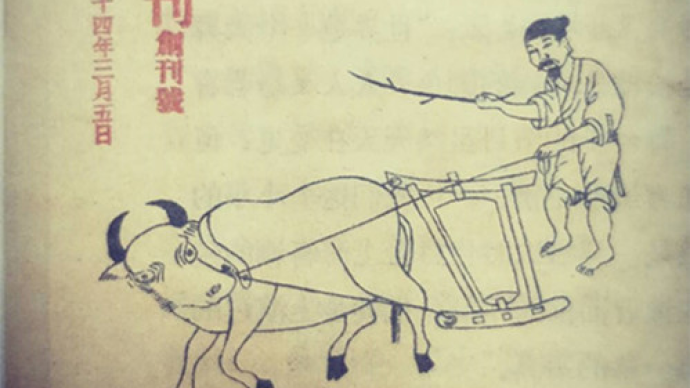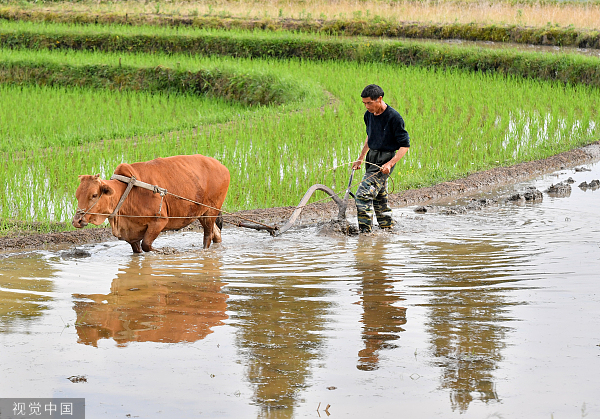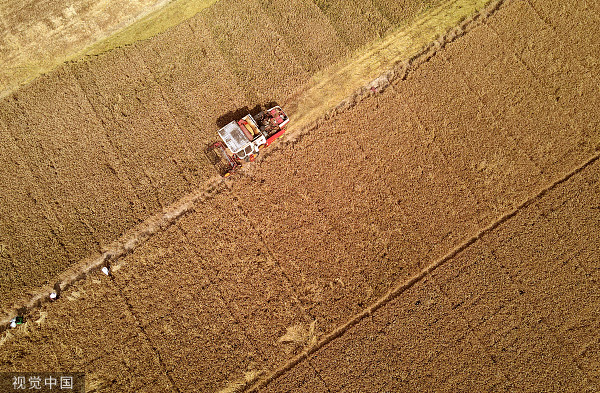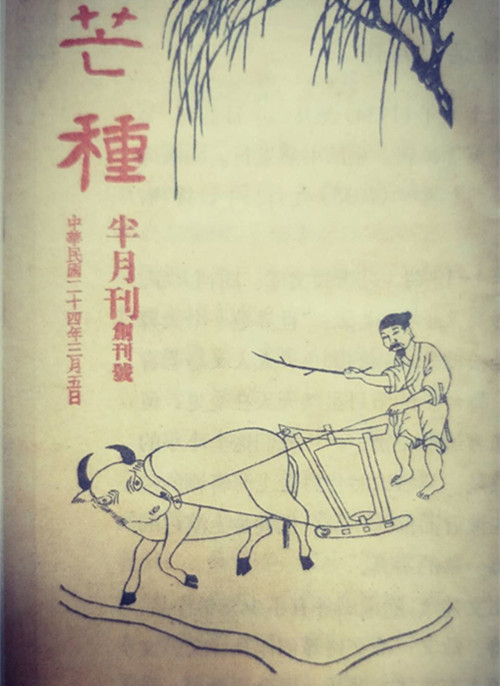
June 6 is the mango seed in the twenty-four solar terms. Mango is the ninth solar term in the twenty-four solar terms and the third solar term in summer.
As the name suggests, mango is a very "busy" solar term. "The awn seed is the harvest season of awn crops, and the awn crops here refer to the wheat crops in the Yellow River Basin. During the awn seed season, both summer wheat and rice are harvested, and they are harvested and planted at the same time, so they are very busy." " said Bi Xuling, director of the Folklore and Intangible Cultural Heritage Research Office of the Institute of Literature, Shanghai Academy of Social Sciences.
It was also during this period that the middle and lower reaches of the Yangtze River also began to enter the wet and rainy Huangmei season. "It rains everywhere in the yellow plum season, and frogs are everywhere in the green grass and pond." After Huangmei, the hottest summer of the year is coming.
During the awn planting season, the sun continues to move northwards close to the Tropic of Cancer, which is the longest sunshine time of the year, the temperature soars, and the warm and moist air of the ocean brings a lot of rainfall, which penetrates deep into the inland of the northern hemisphere, providing a lot of heat and water needed for summer crops. . At this stage, when it is sunny, the sun is hot, and when it rains, it rains heavily.
During this period, farmers had to thresh wheat on sunny days. Because the wheat was not harvested, it was very likely that it would germinate under the rain and would not be edible. The rainy period is suitable for rice growth. If the rice is not transplanted in time, the best growth period of rice seedlings will be missed, and the autumn harvest will be hopeless. This is also the reason why the mango is so busy.
As the saying goes, "Spring fights for the sun, summer fights for the time, Xiaoman catches up with the sky, and the awn seed catches up with the carving", "the time of contention" is the best portrayal of this busy season.
Bai Juyi's "Viewing the Wheat" depicts the scene of the awn planting season: "The Tian family is less free in the moon, and the people are busy in May. The south wind blows at night, and the wheat turns yellow."
Lu You's "Shiyu" poetically describes the scene of awns in the south of the Yangtze River: "Shiyu and awns are planted in the four fields. Every family has beautiful wheat and rice, and there are long songs everywhere."
Although mango seed is the busiest season, it is also a beautiful harvest season, so it is constantly praised by scholars and scholars. The wheat is harvested, the grains are returned to the warehouse, the rice is transplanted in time, and the foundation for the autumn harvest has been laid.
Every house rains during the Huangmei season
Before and after the planting, from Jiangnan to Jianghuai, the middle and lower reaches of the Yangtze River gradually entered the rainy season, which usually lasted for nearly a month.
"Wheat ripens in the wind, plum catches the yellow in the rain", "every house rains in the yellow plum season, and frogs are everywhere in the green grass pond"... The name of plum rain borrows the phenology of plum maturity and is familiar to the public. In the Eastern Han Dynasty, there was a saying of "Huang Meiyu" in the waiting ballads of "Simin Yueling". The word "Meiyu" is a 2000-year-old word that transcends national borders as a general term for similar weather in related regions. "Plum" is also homophonic with "mould", and in the long rainy season, it is also the season when mold is easy to breed.
"The solar term of mangosteen is in the rainy season in the south of the Yangtze River. Plum is the best spokesperson, and 'green plum cooking wine' is also an elegant custom of mangosteen." Fang Yun, a lecturer at the School of International Education and a doctor of folklore at Shanghai University, focused on the "plum" during the yellow plum season.
"Green plum is the fruit of plum trees. The history of viewing plum blossoms in China is much later than eating plums. In ancient times, plums were mainly known as condiments. Because of their strong sour taste, sour plums were used instead of vinegar. , In grand banquet occasions, it is often indispensable."
"Book of Rites • Nei Ze" records: "For pig, chives are used in spring, and polygonum is used in autumn. Scallions are used for fat, scallions are used for ointment, glutinous rice is used for three animals, and acylides are used for animals, and plums are used for animals." It is only when cooking and eating animal meat that plums are used as seasoning to become a delicacy.
"Shangshu·Shuoming" also records the words of Wuding, Emperor Gaozong of Yin Shang, who said to Prime Minister Fu, "If you make a soup with soup, you can only use salt and plum." The sour taste is needed for seasoning. It refers to the talents needed by the country, and it also symbolizes the mutual trust between friends and mutual responsibility in their careers.
During the Tang Dynasty, many places already offered "meijian", that is, candied fruit made from plum, as a tribute to the monarch. The "Huamei" that we are most familiar with was also born in the Song Dynasty with the popularity of Xiaoshuoben's literary themes. According to legend, Mr. Shushu had been talking for a long time, and his mouth was dry, so he held a salted plum in his mouth, and his mouth was full of saliva, so he could continue talking.
"A plum in the sun keeps you safe" and "Plum removes three poisons", all of which are said to have health benefits such as quenching thirst, relieving cough, stopping diarrhea, stopping bleeding, and relieving pain.
Fang Yun feels that with the rapid development of urbanization nowadays, many people are far away from the agricultural life reflected by the twenty-four solar terms, but from eating plums, drinking plum wine, and drinking sour plum soup, one can also feel the benefits brought by "mango seeds" and "plum rain". Natural phenological changes are also a way to understand and inherit the twenty-four solar terms, "such as the budding, flowering, fruiting and falling leaves of plants, dormancy, awakening, breeding and migration of animals, which occur naturally under the regulation of natural laws. , this is the natural phenology. In our solar term life and contemporary life, if we are estranged from farming and production, we can take contact with nature as an entry point for the continued inheritance of modern urban life.”
"Sacrificing to the God of Flowers" during the Mango season
During the period of mangosteen, in addition to the large-scale Dragon Boat Festival, there is another festival that has disappeared, which is to worship the flower god. Every year on the second day of the second month of the lunar calendar in my country, we welcome the flower god. It is almost May, and it is about to enter the hot summer, and hundreds of flowers begin to wither. Folks often hold rituals to worship the flower gods on the day of the mangosteen, and arrange various gifts for the flower gods. Some people hang flower branches with silk to show farewell and express their love Thanks to the Flower God, I hope that the Flower God can come to the world again in the coming year. Cui Lingsi of the Liang Dynasty in the Southern Dynasty said in the "Three Rites of Righteousness": "If the mango seed is the festival in May, the valley of the mango can be planted when speaking, so it is named after the mango seed, and the mango seed festival will hold a festival to worship the god of flowers."
In the twenty-seventh episode of "Dream of Red Mansions", "Dicui Pavilion Yang Concubine plays with colorful butterflies, buried incense mound and flying swallows weeping red" records the scene of offering sacrifices to the God of Flowers in Daguan Garden: "The next day is April 26th. , It turns out that this day is not the time for the Jiaomangjing Festival. It is still an ancient custom: on this day of the Jiaomangjing Festival, all kinds of gifts should be arranged, and the flower gods should be sacrificed. It is said that when the mangosteen is over, it will be summer, and all the flowers will be unloaded. When the god abdicates, it is necessary to take a farewell ceremony. However, this custom is more popular in the boudoir, so the people in the Grand View Garden all get up early. Those girls are either made of petals and willow branches into a sedan chair, or made of silk brocade and gauze. Every tree and every flower are tied with these things. The embroidery ribbons are swaying in the garden, the flowers are blooming, and these people are dressed in peach and apricot. Jealousy and ashamed, I can’t tell all of it for a while.”
"Mango Seeds" was first published by Shanghai Mass Magazine, and the ninth issue of the first volume was published by Beixin Publishing House. From October 5th of the same year to the first issue of the second volume, there were thirteen issues.
"Mango seed is a special solar term, which contains two kinds of information: harvesting and sowing." Fang Yun said. As a season that reflects phenology, there is a sense of urgency in folk awn seeds, but it also derives rich meanings and becomes a season for us to praise cultivation and harvest.
As the name suggests, mango is a very "busy" solar term. "The awn seed is the harvest season of awn crops, and the awn crops here refer to the wheat crops in the Yellow River Basin. During the awn seed season, both summer wheat and rice are harvested, and they are harvested and planted at the same time, so they are very busy." " said Bi Xuling, director of the Folklore and Intangible Cultural Heritage Research Office of the Institute of Literature, Shanghai Academy of Social Sciences.
It was also during this period that the middle and lower reaches of the Yangtze River also began to enter the wet and rainy Huangmei season. "It rains everywhere in the yellow plum season, and frogs are everywhere in the green grass and pond." After Huangmei, the hottest summer of the year is coming.

During the planting season, farmers in Guizhou drive their cattle to plough the fields. Visual China Map
Harvest while plowingDuring the awn planting season, the sun continues to move northwards close to the Tropic of Cancer, which is the longest sunshine time of the year, the temperature soars, and the warm and moist air of the ocean brings a lot of rainfall, which penetrates deep into the inland of the northern hemisphere, providing a lot of heat and water needed for summer crops. . At this stage, when it is sunny, the sun is hot, and when it rains, it rains heavily.
During this period, farmers had to thresh wheat on sunny days. Because the wheat was not harvested, it was very likely that it would germinate under the rain and would not be edible. The rainy period is suitable for rice growth. If the rice is not transplanted in time, the best growth period of rice seedlings will be missed, and the autumn harvest will be hopeless. This is also the reason why the mango is so busy.
As the saying goes, "Spring fights for the sun, summer fights for the time, Xiaoman catches up with the sky, and the awn seed catches up with the carving", "the time of contention" is the best portrayal of this busy season.

During the planting season, a worker drives a combine harvester to harvest wheat in a wheat field in Hebei. Visual China Map
"The Seventy-two Hours of the Moon Order" mentioned the awn seeds: "May Day, it means that the grains with awns can be planted." This means that the seeds of awn crops such as barley and wheat have matured, and the harvest is very fast. urgent. In most parts of the north, awn seeds are also a busy season for planting crops such as late grain, millet, and millet. It is often said that "Three Summers" is the busy season, which is where it comes from. During the awn planting season, agricultural production in most parts of my country is busy in the "three summers" of "summer harvest, summer planting, and summer growth".Bai Juyi's "Viewing the Wheat" depicts the scene of the awn planting season: "The Tian family is less free in the moon, and the people are busy in May. The south wind blows at night, and the wheat turns yellow."
Lu You's "Shiyu" poetically describes the scene of awns in the south of the Yangtze River: "Shiyu and awns are planted in the four fields. Every family has beautiful wheat and rice, and there are long songs everywhere."
Although mango seed is the busiest season, it is also a beautiful harvest season, so it is constantly praised by scholars and scholars. The wheat is harvested, the grains are returned to the warehouse, the rice is transplanted in time, and the foundation for the autumn harvest has been laid.
Every house rains during the Huangmei season
Before and after the planting, from Jiangnan to Jianghuai, the middle and lower reaches of the Yangtze River gradually entered the rainy season, which usually lasted for nearly a month.
"Wheat ripens in the wind, plum catches the yellow in the rain", "every house rains in the yellow plum season, and frogs are everywhere in the green grass pond"... The name of plum rain borrows the phenology of plum maturity and is familiar to the public. In the Eastern Han Dynasty, there was a saying of "Huang Meiyu" in the waiting ballads of "Simin Yueling". The word "Meiyu" is a 2000-year-old word that transcends national borders as a general term for similar weather in related regions. "Plum" is also homophonic with "mould", and in the long rainy season, it is also the season when mold is easy to breed.
"The solar term of mangosteen is in the rainy season in the south of the Yangtze River. Plum is the best spokesperson, and 'green plum cooking wine' is also an elegant custom of mangosteen." Fang Yun, a lecturer at the School of International Education and a doctor of folklore at Shanghai University, focused on the "plum" during the yellow plum season.
"Green plum is the fruit of plum trees. The history of viewing plum blossoms in China is much later than eating plums. In ancient times, plums were mainly known as condiments. Because of their strong sour taste, sour plums were used instead of vinegar. , In grand banquet occasions, it is often indispensable."
"Book of Rites • Nei Ze" records: "For pig, chives are used in spring, and polygonum is used in autumn. Scallions are used for fat, scallions are used for ointment, glutinous rice is used for three animals, and acylides are used for animals, and plums are used for animals." It is only when cooking and eating animal meat that plums are used as seasoning to become a delicacy.
"Shangshu·Shuoming" also records the words of Wuding, Emperor Gaozong of Yin Shang, who said to Prime Minister Fu, "If you make a soup with soup, you can only use salt and plum." The sour taste is needed for seasoning. It refers to the talents needed by the country, and it also symbolizes the mutual trust between friends and mutual responsibility in their careers.
During the Tang Dynasty, many places already offered "meijian", that is, candied fruit made from plum, as a tribute to the monarch. The "Huamei" that we are most familiar with was also born in the Song Dynasty with the popularity of Xiaoshuoben's literary themes. According to legend, Mr. Shushu had been talking for a long time, and his mouth was dry, so he held a salted plum in his mouth, and his mouth was full of saliva, so he could continue talking.

Hangzhou community volunteers made sour plum soup to relieve the summer heat for epidemic prevention workers. People's Vision
In midsummer, the best thing to quench your thirst is "sour plum soup", a cold drink that has a history of 3,000 years in China. There are "six drinks" in "Zhou Li", among which "glutinous rice", that is, plum juice, is a drink made from plum juice. In the Northern Song Dynasty, sour plum soup was sold on the streets, which was very common."A plum in the sun keeps you safe" and "Plum removes three poisons", all of which are said to have health benefits such as quenching thirst, relieving cough, stopping diarrhea, stopping bleeding, and relieving pain.
Fang Yun feels that with the rapid development of urbanization nowadays, many people are far away from the agricultural life reflected by the twenty-four solar terms, but from eating plums, drinking plum wine, and drinking sour plum soup, one can also feel the benefits brought by "mango seeds" and "plum rain". Natural phenological changes are also a way to understand and inherit the twenty-four solar terms, "such as the budding, flowering, fruiting and falling leaves of plants, dormancy, awakening, breeding and migration of animals, which occur naturally under the regulation of natural laws. , this is the natural phenology. In our solar term life and contemporary life, if we are estranged from farming and production, we can take contact with nature as an entry point for the continued inheritance of modern urban life.”
"Sacrificing to the God of Flowers" during the Mango season
During the period of mangosteen, in addition to the large-scale Dragon Boat Festival, there is another festival that has disappeared, which is to worship the flower god. Every year on the second day of the second month of the lunar calendar in my country, we welcome the flower god. It is almost May, and it is about to enter the hot summer, and hundreds of flowers begin to wither. Folks often hold rituals to worship the flower gods on the day of the mangosteen, and arrange various gifts for the flower gods. Some people hang flower branches with silk to show farewell and express their love Thanks to the Flower God, I hope that the Flower God can come to the world again in the coming year. Cui Lingsi of the Liang Dynasty in the Southern Dynasty said in the "Three Rites of Righteousness": "If the mango seed is the festival in May, the valley of the mango can be planted when speaking, so it is named after the mango seed, and the mango seed festival will hold a festival to worship the god of flowers."
In the twenty-seventh episode of "Dream of Red Mansions", "Dicui Pavilion Yang Concubine plays with colorful butterflies, buried incense mound and flying swallows weeping red" records the scene of offering sacrifices to the God of Flowers in Daguan Garden: "The next day is April 26th. , It turns out that this day is not the time for the Jiaomangjing Festival. It is still an ancient custom: on this day of the Jiaomangjing Festival, all kinds of gifts should be arranged, and the flower gods should be sacrificed. It is said that when the mangosteen is over, it will be summer, and all the flowers will be unloaded. When the god abdicates, it is necessary to take a farewell ceremony. However, this custom is more popular in the boudoir, so the people in the Grand View Garden all get up early. Those girls are either made of petals and willow branches into a sedan chair, or made of silk brocade and gauze. Every tree and every flower are tied with these things. The embroidery ribbons are swaying in the garden, the flowers are blooming, and these people are dressed in peach and apricot. Jealousy and ashamed, I can’t tell all of it for a while.”

The first issue of "Mango"
Fang Yun also mentioned, "There are two very well-known magazines, one is "Mung Seed" and the other is "Harvest", both of which are related to pen farming." The "Mung Seed" magazine was born in China in 1935, although it has been seen in the north. The smoke of the wolf rises, and the literary world is also shrouded in haze, but the ever-increasing national crisis and the fierce and complex ideological confrontation are, for literature, a solar term for cultivation and sowing. "Mango Seeds" was founded in Shanghai on March 5, 1935, edited by Xu Maoyong and Cao Juren. On the cover of the first issue, there is a woodcut "Ox Ploughing Picture", which can better illustrate the editor's idea of running the journal. . The name of "Mango Seeds" probably also pinned the hopes of the editor-in-chief. "Although the harvest is irreversible, in the season of cultivation, the son of the earth always works hard. The picture of cattle farming on the cover of the publication is the representation of the image.""Mango Seeds" was first published by Shanghai Mass Magazine, and the ninth issue of the first volume was published by Beixin Publishing House. From October 5th of the same year to the first issue of the second volume, there were thirteen issues.
"Mango seed is a special solar term, which contains two kinds of information: harvesting and sowing." Fang Yun said. As a season that reflects phenology, there is a sense of urgency in folk awn seeds, but it also derives rich meanings and becomes a season for us to praise cultivation and harvest.
Related Posts